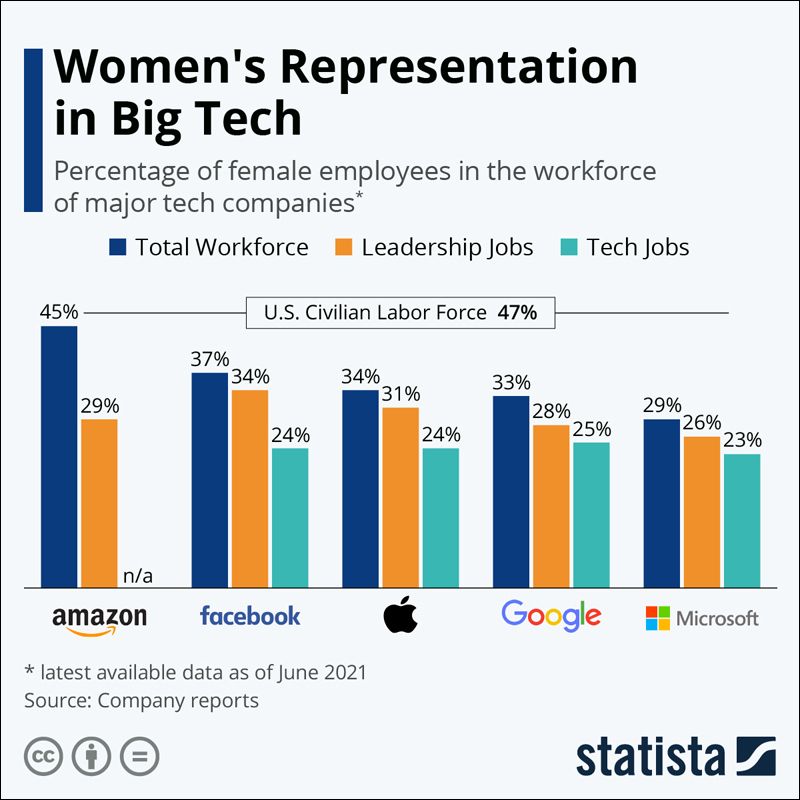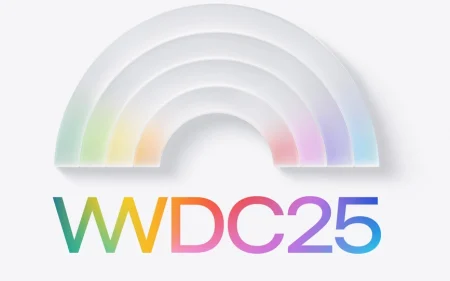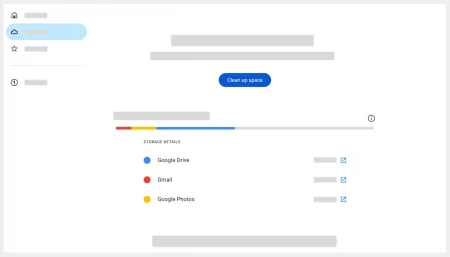According to the latest available data, women hold 26.5 percent of executive, senior-level and management positions in S&P 500 companies
There have been many cases of whistleblowing in the tech industry in recent years. Frances Haugen exposed personal data exploitation at Meta. Timnit Gebru called out ethical non-compliance at Google while Rebecca Rivers raised her voice regarding issues involving Artificial Intelligence in the same organization. Janneke Parrish brought up the case of discriminatory work culture at Apple.
Apart from the fact that these happen to be 4 of the big 5 companies in the tech sector, the other coincidence is that all four of the aforementioned employees happen to be women. Which brings up the question… is that really a coincidence? Or are women more likely to be whistleblowers?
Reasons behind Whistleblowing
What are the reasons behind the whistleblowing? Do these women act out of spite towards their respective organizations or are they just more ethical than their male counterparts? Is it because they are more concerned about the companies and their responsibilities towards society or is it that they wield less influence than their male colleagues?
Well, first things first, whistleblowing comes with a lot of repercussions. Which means that it is a sort of last resort that one subscribes to only when all other methods to achieve justice have failed. Despite the culture of openness, honesty and values that companies harp about, when employees raise concerns about problems that fester within, these organizations use their power and influence to brush the issues under the carpet.
No matter how much power or resources employees possess, they are powerless in front of the company’s might. So the only option left for them is to go public with their findings. Or, in other words, whistleblowing is the only way they can bring the matter to light. And while they might be hailed as torchbearers of truth outside, they risk facing the wrath of the company they work for.
It is almost impossible to ascertain the exact percentage of women who are whistleblowers because in most cases, it is done so in a confidential or anonymous manner. But consider this. When it comes to the big 5 of tech – Google, Meta, Apple, Amazon and Microsoft – it is mostly white men in positions of power. Women currently represent only about 25% of their technology workforce and about 30% of their executive leadership.

There is also a prevailing theory that people who are marginalized in an organization lack a sense of belonging. Which means they are less obligated to keep silent when they sense wrongdoing.
Sherron Watkins, who blew the whistle on the infamous Enron financial scandal in the mid-’90s, had an interesting answer as to whether she being a woman had anything to do with alerting management about the scam.
She said women are not part of the “old boys’ club”, so as a woman she was not concerned about being kicked out of the club, because “you didn’t belong to one in the first place.”
What Studies have revealed
There have been various research findings and studies that reveal that women are generally more ethical than men. Recently, the United Nations, in its world development goals, said that women’s global empowerment was the key to reducing corruption and inequality.
“Opening professional doors for women has a decisive impact on corruption patterns, transparency and public accountability,” claimed a UN press release titled Addressing The Gender Dimensions Of Corruption.
Some Latin American cities also proposed and moved to an all-women traffic enforcement setup, claiming that “female police officers are more impervious to bribes.” Commander Pedro Montoya, who is in charge of training Peru’s all-female motorcycle brigade, said that it was “undeniable” that women are more honest.
There are several more studies and research papers that suggest that women are indeed the fairer sex, and not in terms of skin tone. One study concluded that more women in positions of power equates to less corruption while another one claimed women are more ethical when it comes to business dealings. Yet another research paper revealed that businesses led by women are less likely to be involved in bribery or corruption.
What happens to Women Whistleblowers
Even if several studies claim that women are more likely to come forward regarding unethical practices at an organization, it also needs to be kept in mind that they are likely to face more repercussions.
When the person in question is a woman, the conversation quickly turns to gender-related criticism. It is claimed that women are “not team players” or “too strict” or “do not understand the system.” They are branded as “hysterical”, “rule-bound”, “disloyal” or “cranks.”
Professor Marcia Miceli of the McDonough School of Business at Georgetown University co-authored a book called Whistle-Blowing in Organizations. In that, she spoke about how women face more injustice in the aftermath of whistleblowing. “The levels of retaliation as perceived by the women we surveyed were greater than those perceived by men. Even if the woman had significant power within the organization, she still wasn’t protected.”
Jane Turner, a former FBI whistleblower and a highly decorated 25-year veteran Special Agent, agrees with Miceli. “Academic studies have shown that female whistleblowers face more reprisal than male whistleblowers. Female whistleblowers, no matter what organizational power they possess, were granted no such favor.”
Speaking to WNN, she continued: “The role of a successful woman is destroyed and any protection she might have received prior is lost because a whistleblower role is not seen as appropriate for a woman. Therefore, the reigning thought is the woman deserves the retaliation for stepping outside her gender role. I have seen this phenomenon myself as an FBI Agent. I have interviewed several women who have felt that the severe retaliation they endured was unique to their gender. Under the general umbrella of ‘nuts and sluts,’ organizations have determined the need to rid themselves of women who do not seem to accept their organizational role.”
First-hand Reports from Whistleblowers
Haugen was a former data scientist at Facebook. Before leaving the company, she copied confidential documents and shared them with lawmakers and regulators as well as The Wall Street Journal, which published a series of reports called the Facebook Files.
One of those Facebook studies found that 13.5% of teen girls in England admitted their suicidal thoughts became more frequent after starting on Instagram. Another study found 17% of girls from the same age bracket said their eating disorders got worse after using Instagram.
Facebook in turn has been attacking Haugen, claiming that she is the one who has broken the law. Company executive Monika Bickert told CNN that the documents Haugen obtained were “stolen”. Federal whistleblower protections provide legal cover, but experts believe that the leaks to the press could trigger legal action from the social network.

Gebru (also mentioned in the first paragraph) is a leader in AI ethics research, who was ousted from Google after she refused to retract a research paper about the downfalls of a type of AI software that powers the company’s search engine.
After her dismissal, she faced severe online hate from people with no ties either to her or to Google. She was accused of creating a “toxic environment” and even those who support her were dismissed as “deranged activists”.
“Being a Black woman, it was very different,” Gebru said. “There’s a specific strand of vitriol you deal with.” The onslaught of insults and harassment directed at her is so vile that there is a specific term for it: misogynoir, hatred aimed at Black women.
Final Thoughts
For women who go on to become whistleblowers, the whistleblower reward laws are a very important protection tool. The whistleblower reward laws provide financial incentives which are very crucial as in most cases the employee faces dismissal and revoking of all company benefits. But more importantly, the law also extends other benefits including anti-retaliation rules, clear reporting procedures, and confidentiality.
But that being said, it is imperative that we have more women in positions of power in the technology sector. With technological advancements threatening data privacy, phishing, pretexting and so much more, it is essential that virtuous employees exist who are more likely to call out any case of fraud or foul play.
In the 1920s, the New York State Women Suffrage Association made a statement while campaigning for women to be allowed to vote. It said: “Women are, by nature and training, housekeepers. Let them have a hand in the city’s housekeeping, even if they introduce an occasional house-cleaning.”
In simpler words, it meant to say that letting women vote would help “clean up” the mess that men had made. With all that’s happening in the world of tech, a major clean-up is long overdue in this industry as well!
In case you missed:
- How Meta AI stopped Lucknow Woman from committing Suicide
- AI Chaos: Why OpenAI, Google and Microsoft Keep Shifting Strategies
- How India broke its Paralympics Medal Tally by using Assistive Tech
- Target, NVIDIA Best Tech Workplaces in India, Amazon, InMobi among Worst
- Mary Meeker’s AI Report: ChatGPT is Growing Faster than Google Search
- How AI is Revolutionizing Combat for Indian Defence Forces
- Active Listening Feature on Phones raises Privacy Concerns
- OpenAI is now Focussing on Superintelligence!
- Talk to ChatGPT with new AI Glasses
- Should Chatbots have Rights? Ethicality vs Practicality










2 Comments
Its very good, but very lengthy
women whistle-blower article was awesome!